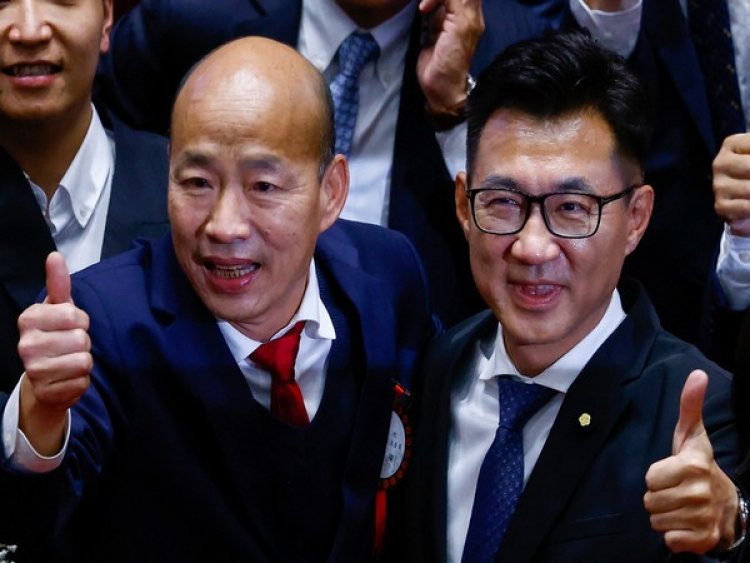Pro-China Opposition politician elected Speaker in Taiwan

Taipei, Taiwan: A few weeks after the ruling Democratic Progressive Party (DPP) won an unprecedented third term in office, Taiwan's legislature elected Han Kuo-yu, a politician from the China-friendly opposition Kuomintang (KMT) as its new speaker on Thursday, Voice of America reported.
According to the report, the victory could lead to legislative gridlock and potentially create an opening for Beijing to influence domestic politics.
"We are in for a very slow and lackluster set of time in which we are not going to see any sort of policy being able to be passed with this kind of stonewall approach to politics," Lev Nachman, a political scientist at National Chengchi University in Taiwan said.
The election of a new Speaker comes nearly three weeks after the ruling Democratic Progressive Party, or DPP, won an unprecedented third term in office, winning the presidential election but losing its majority in the legislature. Thursday was the first day of Taiwan's new legislature, and Han received 54 votes, while the DPP's candidate, You Si-kun, received 51 votes.
The Voice of America said in its report that the legislature's third political party, Taiwan People's Party, or TPP, was initially seen as a potential partner in helping either party to secure the speakership. But after voting for their own candidate in the first round of the speaker election, the eight legislators from the TPP abstained from voting in the second round.
Following the vote, Han said since all Taiwanese expect the legislature to be united and to prioritize people's benefits, he hopes all three political parties can explore the possibility of working together on important social and economic issues.
"The general public expects a new and reformed Legislative Yuan that is solid and practical in creating happiness for the common people, and this is the responsibility on my shoulders," he told reporters outside the legislature following the election.
Taiwan's Premier Chen Chien-jen, who typically works closely with the legislature on key policy agenda, congratulated Han on becoming the new speaker and said his office was committed to communicating with the new legislature and responding to feedback from civil society.
Thursday's election result also confirms that for the next four years, Taiwan's government will be divided, with the pro-sovereignty DPP controlling the executive branch of government and the main opposition KMT controlling the largest bloc of seats and the speakership in the legislature.
Neither party will be able to secure the votes needed for passage of legislation without support from TPP lawmakers, which has taken more of a middle-of-the-road approach when it comes to China, advocating engagement with Beijing but also upholding Taiwan's sovereignty.
Some experts say legislation related to certain issues will likely face serious challenges.
"I think new policy proposals related to national defence, foreign policy or cross-strait relations will face more obstacles in the new legislature," Yeh Yao-yuan, an expert on Taiwan politics at the University of St. Thomas in Texas, told VOA by phone.
While defence and cross-strait-related legislation will require more negotiation among political parties, Yeh said some policy proposals that are likely to benefit most Taiwanese people, such as education and healthcare, may find room for cooperation.
"The most important aspect in Taiwan's legislature is negotiation between political parties, so with the new legislature taking office today, one important thing to keep an eye on is what will be the outcome of party negotiation in the legislature and whether they can facilitate proper negotiations," Yeh said.
More negotiation and outreach will also be necessary between the legislature and the incoming DPP administration. President-elect Lai Ching-te will be sworn into office on May 20.
"Whether policymaking will be seriously stalled in Taiwan for the next four years depends on how the incoming administration negotiates with the opposition parties," Chen Fang-yu, an expert on Taiwan politics at Soochow University in Taiwan, told VOA by phone.
In his view, the DPP should prioritize policy proposals that may face less challenge from opposition parties and try to engage the KMT and TPP in those areas. "Policies related to social welfare and long-term care are less likely to face objection from opposition parties, so these are areas that the new administration could prioritize," he said.
Since Han has a track record of maintaining friendly ties with the Chinese government, including holding a meeting with Chinese officials during his trip to Hong Kong in 2019 as the mayor of Kaohsiung, Chen thinks Beijing may try to influence Taiwan's domestic politics through the legislature. "One possible development is the Chinese government may invite Han to visit China," he said, VOA reported.
During a regular press conference on Wednesday, the spokesperson of the Chinese Communist Party's Taiwan Affairs Office urged the two opposition parties in Taiwan to exercise "effective supervision and strong checks and balances" on the ruling DPP in order to "live up to the public's expectation."
Nachman in Taipei said Beijing's rhetoric indicates that China will likely be pleased about Han's election. "This is a victory for [Beijing], and they are probably very happy that someone like him can publicly say a lot of stuff that the PRC would prefer Taiwanese politicians to be saying," he told VOA.
In his view, Thursday's result may create incentives for Beijing to adjust its approach toward Taiwan while not "letting Taiwan off" completely. "[The result] doesn't create as much incentive for Beijing to punish Taiwan more, but it doesn't mean they're going to let off Taiwan by any means," Nachman said.















































